
Mercedes unveiled its 2025 electric G-Class tonight – which it’s calling the “G580 with EQ technology” – in Beverly Hills, CA, and we’re here at the reveal with all the details.
Mercedes first surprised us with its “EQG” concept at IAA in 2021. Now it’s heading to production, but with a somewhat more plain name.
At the time we had almost no details, but now we’re learning all about the upcoming electric off-roader here in the wilds of… Beverly Hills, California.
So, maybe no heavy off-roading demonstrations are in the cards for today.
But the electric G-Class does have off-roading chops. It comes with 4 independent electric motors putting out a combined 579hp and 879 lb-ft of torque. Each motor has its own 2-speed transmission, giving access to a low-gear with 2:1 gear reduction for off-roading, and the 4 independent motors mean the car can vector torque to whichever wheels need it – even better than a locking differential.
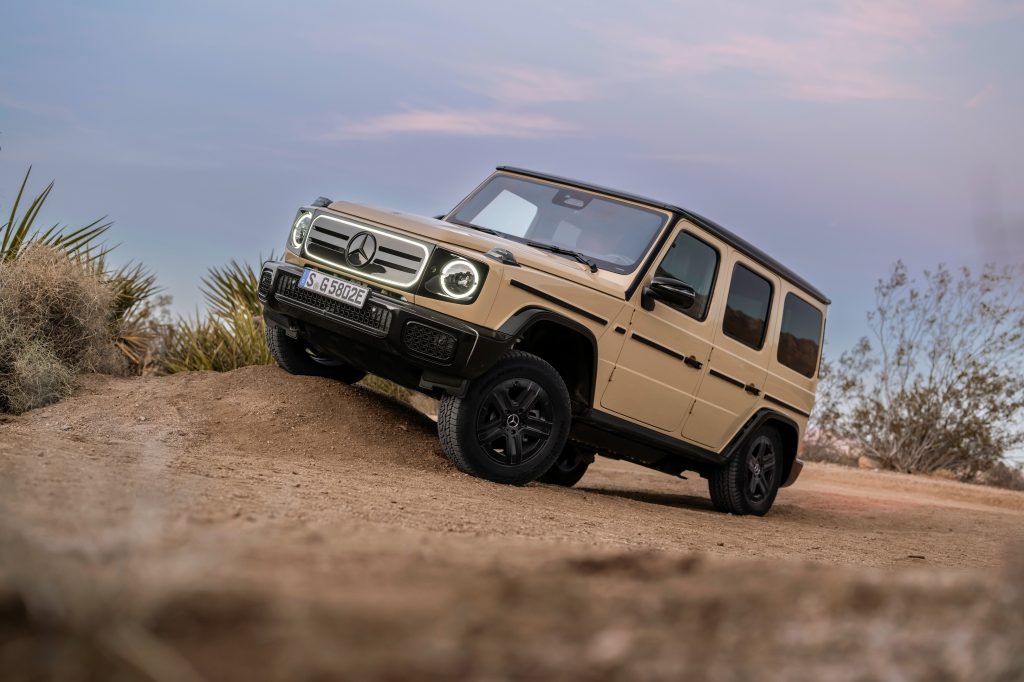
4 wheel motors also means the G580 will be capable of what Mercedes calls G-Turn, its branding of what we’ve previously seen referred to as “tank turn” when Rivian was working on it (but later abandoned and pivoted to “front dig mode” instead). This means it will be able to do 2 full rotations on the spot by spinning the wheels on the left and right sides of the car in opposite directions at once.
However, this feature is more of a toy, just for fun. Mercedes also has a G-steering feature, which is sort of a mini-version of the G-turn, which will help you make extremely tight turns by activating torque vectoring to help make tight turns (though unlike the EQS, it doesn’t have rear-wheel steering).
The G580 can climb up to a 100% (45º) grade and hold stable on lateral slopes of up to 35º, ford 33.5 inches of water (6 inches deeper than the gas version), with 9.8 inches of ground clearance, a 32º approach angle, 30.7º departure angle and 20.3º breakover angle, with independent double wishbone suspension in the front and a solid de Dion axle in the rear.
To help you see where you’re going, the G580 has a “transparent hood” feature, which uses a camera to show what’s in front of and under the car on the internal display. This is important for off-roading, because if you’re going over a ridge or something and can’t see under the hood, the transparent hood can help you see where you’re going.
But it’s also a Mercedes, which means it’s fancy inside. And the 2025 model will be particularly fancy, as it’s only available in EDITION ONE trim with lots of exclusive interior and exterior touches. But you’ll be able to customize the car basically any way you want through Mercedes’ MANUFAKTUR car customization process.
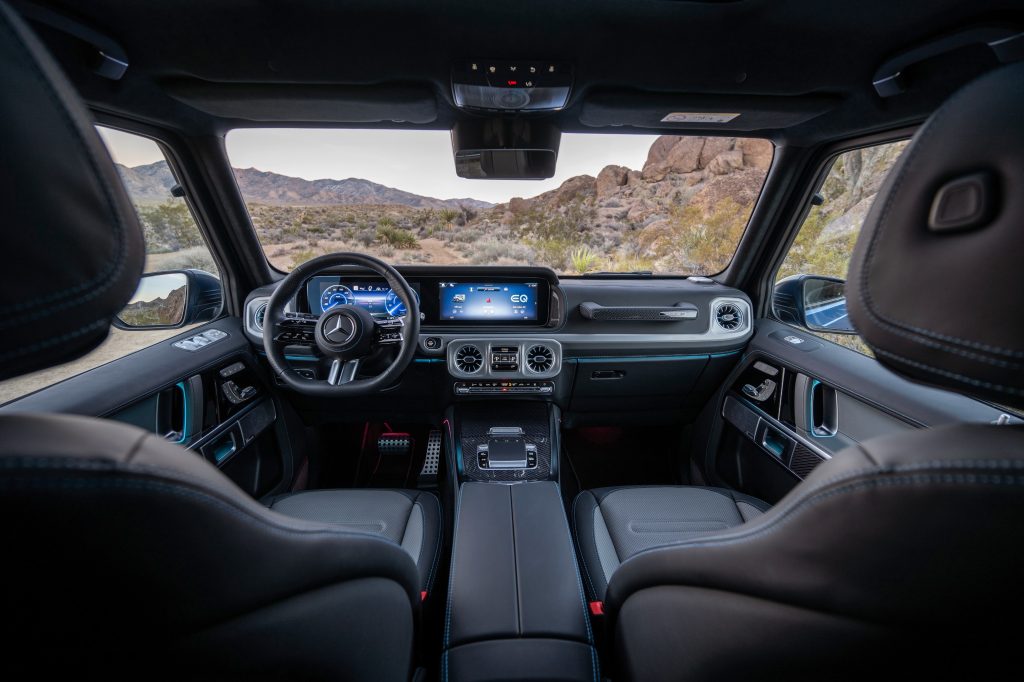
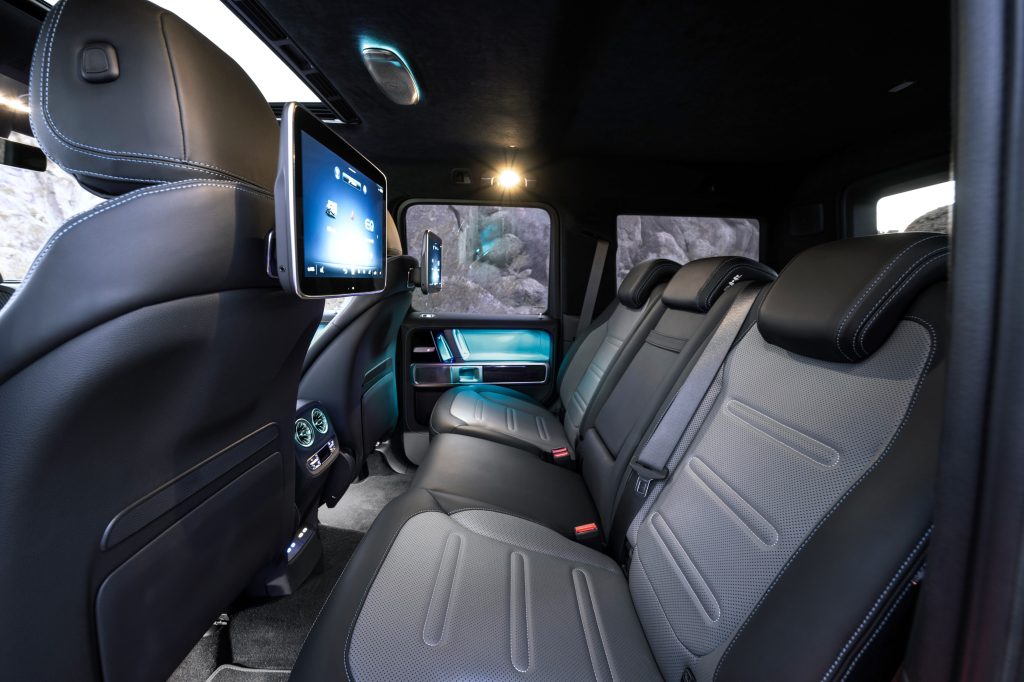
So whether you’re conquering a real jungle or just the concrete jungle of… Rodeo Drive, or Las Vegas for the latest cryptocurrency convention, you’ll feel right at home in the Mercedes G-Class.
That fanciness is certainly needed to justify its price, which Mercedes hasn’t yet released, but said that it will be “in the ballpark” of the G63 (which starts at around $180,000).
The G580 is smaller than the the gas-powered G-Class. At 182″ it’s about 10 inches less long, but just as tall (78″) and as wide (76″). It shares the same 113.8in wheelbase as the gas model.
Otherwise, the exterior shares the boxy design of the gas version. Unlike many EVs, it doesn’t adopt a particularly curvy exterior, and still has a textured grille area.
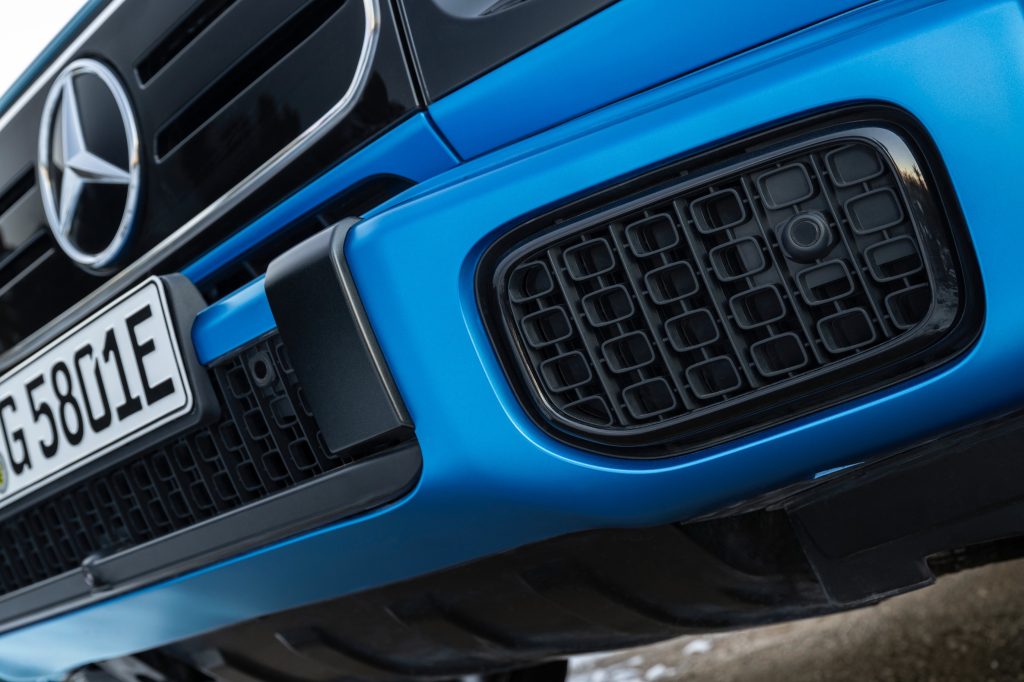
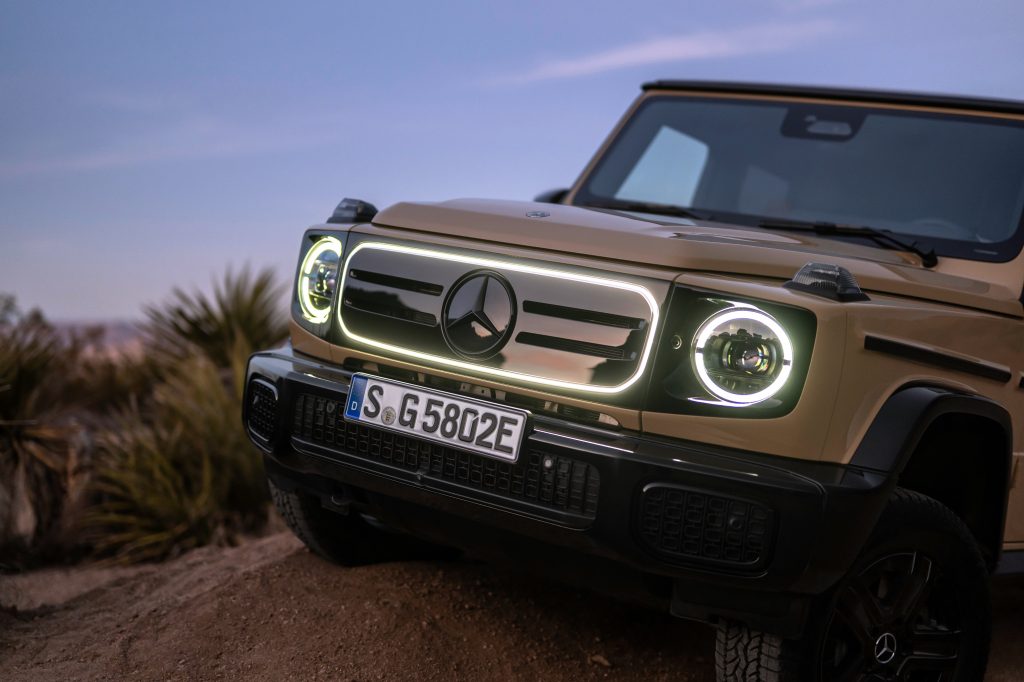
The decision to stick with a traditional-looking grille goes hand in hand with Mercedes’ recent decision to add a “more classic grille option” to its EQS. And it turns out, if you want the G580 with the traditional G-Class grille, you can just get the standard grille, directly from the gas version, if you prefer it (but then you don’t get those cool lights).
And overall, Mercedes said it was very important to maintain the overall design of the G-Class. So it hasn’t tweaked it to make it look electric, other than some grille modifications and a couple aero bits.
Mercedes says the vehicle has “optimized aerodynamics,” which was surely a primary design intent of this vehicle that consists solely of straight lines. But actually, there have been a couple small changes, like a slightly modified A-pillar and a strip above the windshield to smooth out the front edge of the roof.
As for details on its electric drive capabilities, the aforementioned 4 motors can sprint to 60mph in an estimated 4.6 seconds, and reach a top speed of 112mph/180kmh. These aren’t the fastest numbers out there, but the car isn’t meant to be a racecar – Mercedes could have gone with a bigger battery, or more power, but that would have meant other compromises elsewhere, and Mercedes said that it was far more important to focus on the total package.

Mercedes hasn’t told us a range number yet, but with a 116kWh battery and a face that’s even flatter than its electric-triangle-on-wheels competition, we can imagine its somewhere in the mid-200s. It’s 473km on WLTP, which is 293mi, but WLTP is a little more lenient than EPA numbers.
More importantly than overall range, Mercedes says the G-Class will DC charge from 10-80% in 32 minutes, with a 200kW peak charging rate (and an 11kW AC charge rate). That maths out to an average charge rate of approximately 150kW on DC over the full session, which is pretty reasonable.
Given the car’s massive 116kWh (usable) battery, it still doesn’t charge nearly as fast as a Hyundai/Kia E-GMP car, but it’s still quite good compared to other chunky EVs (the G580 weighs ~6,800lbs/3,805kg, with a GVWR of exactly 3,500kg – the maximum allowed by German law).
The G580 comes with 5 regenerative braking settings, including Mercedes “D-auto” setting, where the car intelligently decides to apply regenerative braking based on traffic conditions (we recently tried this setting on the eSprinter, but struggled to find a situation where it would be useful). Regen activates off-throttle, suggesting the possibility of one-pedal driving, but we haven’t had a chance to try it out and see if its max 217kW regen braking capacity is really strong enough to avoid most brake pedal usage.

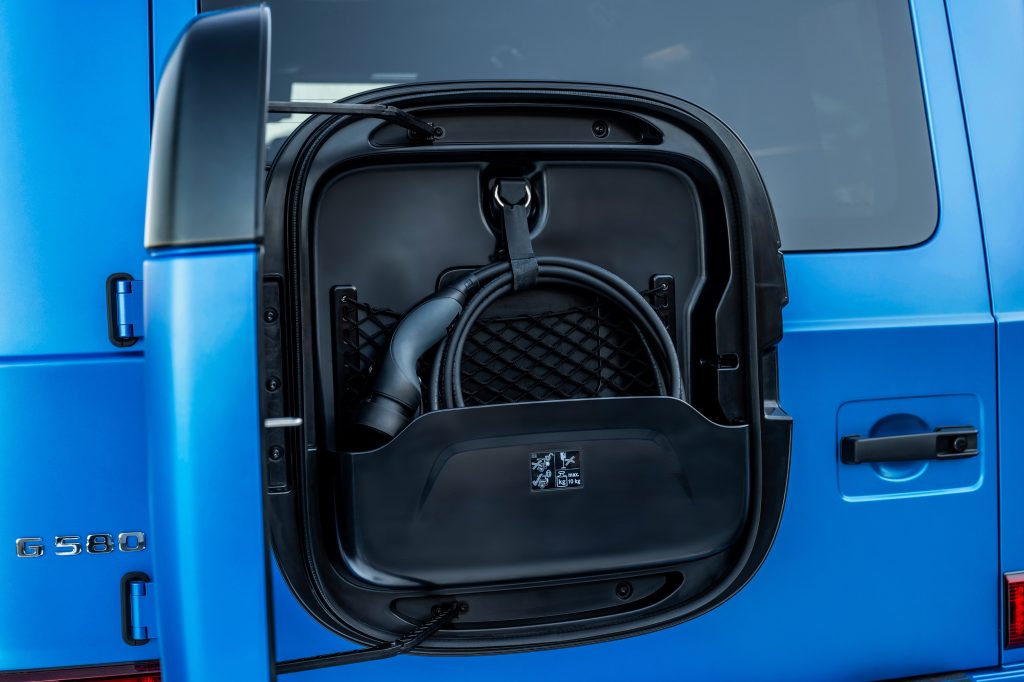
For a final cool electric touch, the car has done something new with its iconic rear end. In place of the spare tire carrier that typically adorns the backside of the G-Class, there’s an optional compartment which can be used to store charging cables or the like. You can still opt for the spare tire, too, but I really like the charging box.
Electrek’s Take
Look, this is a G-Class. It’s a statement car, it’s an image car. If you like it, you know that you like it. For the majority of drivers, its off-road capabilities really won’t matter all that much.
What matters here is whether it stays true to the G-Class, and as far as we can tell, it does. It looks like a G-Class and it feels like a G-Class. The doors thunk closed like a G-Class.
And an important note – Mercedes said, “if the G can go electric, any car can go electric.” We, of course, agree. This is a car that has been defined in many ways by excess, with the gas version getting just 14 miles per gallon. And yet here it is, in electric trim, with a huge battery (but not out of line with other huge EVs), beating the gas version’s performance both on- and off-road.
As for the name – while “G580 with EQ technology” is a bit of a mouthful, I actually like the simple designation “G580.” Surely people will refer to it as “the electric G-Class” or the like, but by giving the car a regular model name, Mercedes is saying that it’s treating the car like a regular car.
Instead of siloing EVs into their own sub-brand, Mercedes is saying that this is a G-Class, and if you want a G-Class, this is a G-Class. Mercedes was clear that this is not a rational vehicle, that its customers don’t need a G-Class, they want a G-Class.
So there you go. If you want a G-Class, this is a G-Class.
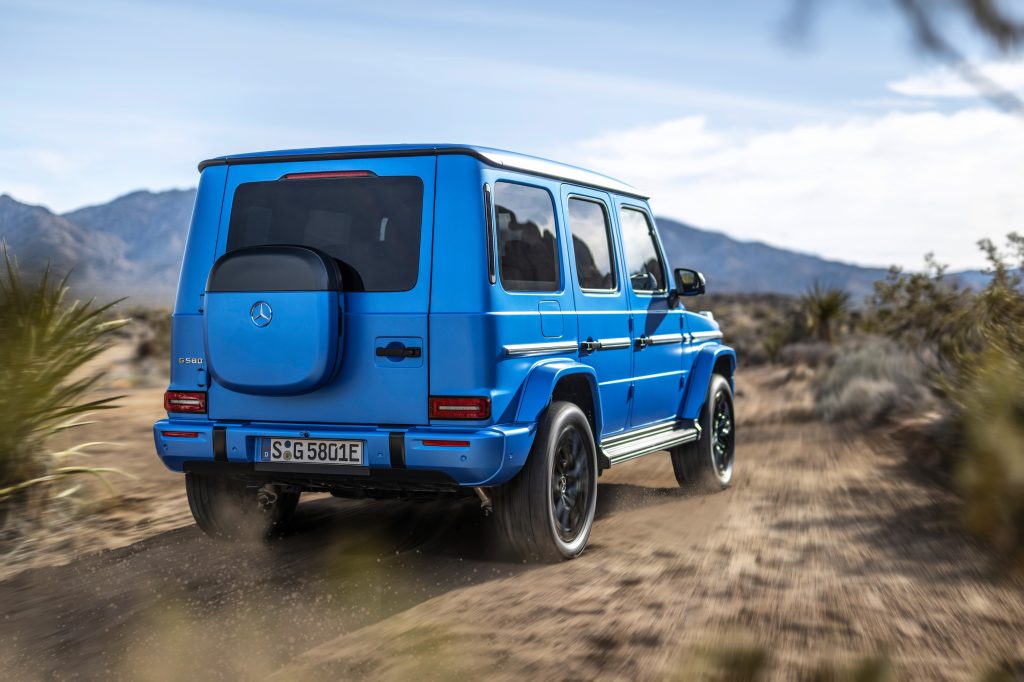
FTC: We use income earning auto affiliate links. More.



